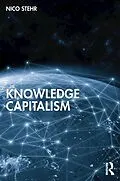In his newest book, Stehr builds on his classic book Knowledge Societies (1994) to expand the concept toward one of knowledge capitalism for a now, much-changed era. It is not only because of the onset of the Covid-19 pandemic that we are living in a new epoch; it is the idea that modern societies increasingly constitute comprehensive knowledge societies under intensive capitalism, whereby the legal encoding of knowledge through national and international law is the lever that enables the transformation of the knowledge society into knowledge capitalism. The Trade Related Aspects of Intellectual Property Rights agreement, negotiated between 1986 and 1994 as part of the World Trade Organization, is the backbone of the modern society and marks a clear historical demarcation, and although knowledge capitalism is primarily an economic development, the digital giants who are in the driver's seat have significant effects on the social structure and culture of modern society.
Autorentext
Nico Stehr is Karl Mannheim Professor of Cultural Studies Emeritus at the Zeppelin University, Friedrichshafen, Germany. He is a fellow of the Royal Society (Canada). He is one of the authors of the Hartwell Paper on climate policy. His recent books include The Power of Scientific Knowledge (with Reiner Grundmann, Cambridge University Press, 2012); Is Liberty a Daughter of Knowledge? (Cambridge University Press, 2016); Understanding Inequality: Social Costs and Benefits (with Amanda Machin, Springer, 2016); Knowledge: Is Knowledge Power? (with Marion Adolf, Routledge. 2017); Society & Climate (with Amanda Machin, World Scientific, 2019); Money. A Social Theory of Modernity (with Dustin Voss, Routledge, 2020).
Klappentext
In his newest book, Stehr builds on his classic book Knowledge Societies (1994) to expand the concept toward one of knowledge capitalism for a now, much-changed era. It is not only because of the onset of the Covid-19 pandemic that we are living in a new epoch; it is the idea that modern societies increasingly constitute comprehensive knowledge societies under intensive capitalism, whereby the legal encoding of knowledge through national and international law is the lever that enables the transformation of the knowledge society into knowledge capitalism. The Trade Related Aspects of Intellectual Property Rights agreement, negotiated between 1986 and 1994 as part of the World Trade Organization is the backbone of the modern, marks a clear historical demarcation, and although knowledge capitalism is primarily an economic development, the digital giants who are in the driver's seat have significant effects on the social structure and culture of modern society.
Inhalt
Preface
Acknowledgements
1. Theories of society
2. Knowledge about Knowledge
3. From Knowledge societies to Knowledge Capitalism
4. The politics of knowledge capitalism
5. Winds of change: Conclusions
Bibliography
Name Index
Subject Index
